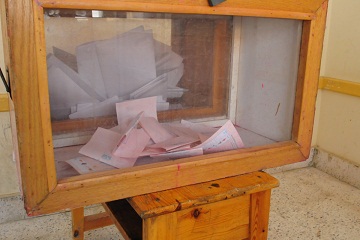
Despite the agreement of judicial bodies to supervise the constitutional referendum, judges can refuse to participate, leading to uncertainty over the referendum.
Judicial bodies like the Supreme Judiciary Council (SJC), the State Council, Administrative Prosecution and State Litigation Authority agreed to delegate judges and prosecutors to supervise the referendum scheduled for 15 December.
On Sunday, the Judges’ Club announced their refusal to supervise the referendum in response to President Mohamed Morsy’s recent constitutional declaration.
They called the referendum “null and void” because of the declaration that, they say, represents a blatant assault to the independence of the judiciary.
President Morsy issued a constitutional declaration on 22 November that protects his decisions from judicial review. He also removed former Prosecutor General Abdel Meguid Mahmoud and replaced him with Tala’at Abdallah.
“Supervising the referendum is not obligatory; they can refuse without any penalties,” said Judge Tamer Kamal from Bani Suef Court of Appeals.
He said that delegating judges required the agreement of three parties, the SJC, the judge and the general assembly of the court to which the judge belongs.
“If a majority of judges boycott the referendum, Morsy can release another declaration assigning another body to oversee it… the situation is already far from being legal” said a public relations official at the judges’ club who refused to reveal his name.
“Judges are paid huge amounts of money in return for supervising the referendum, which makes it hard to convince some of them not to,” he added.
The allowance a judge receives for supervising the referendum has reportedly been increased to EGP 20,000, but the Ministry of Justice could not be reached for confirmation.
The official said that if Morsy were to annul the constitutional declaration, the judges club would oversee the referendum.
Head of judges’ club Ahmed Al-Zend held a press conference on Tuesday concerning the club’s decision to boycott the referendum.
“Those who say 50 per cent of judges agreed to supervise referendum are liars,” said Counsellor Ahmed Al-Zend.
He added that he had expected Minister of Justice Ahmed Mekki to condemn the interference of executive authority in the judiciary, “but [Mekki] is supporting it instead.”
Al-Zend said that judges face pressures from court heads and other judges to take part in the referendum.
“If all members of any given court agree to supervise the referendum, then I should resign, as I would have lied to you all,” Al-Zend said.
Head of media committee of the State Litigation Authority Samir Al-Kamash said that he supported supervising the referendum because it is a “national duty.”
“We conducted a poll among judges of the State Litigation Authority Club and the majority was for participating in the referendum,” he said.
Al-Kamash added that one judge could supervise two ballot boxes if there were not enough judges.
Mohamed Salem, deputy chairman of the Court of Cassation said Morsy is the only one who can end the current rift, if he reaches out to judges.
“Officials are hurting the reputation of judges everyday in the media; instead of honouring our judges we humiliate them… judges should not interfere in elections, let the state find another body to supervise it. Enough humiliation,” he said.

